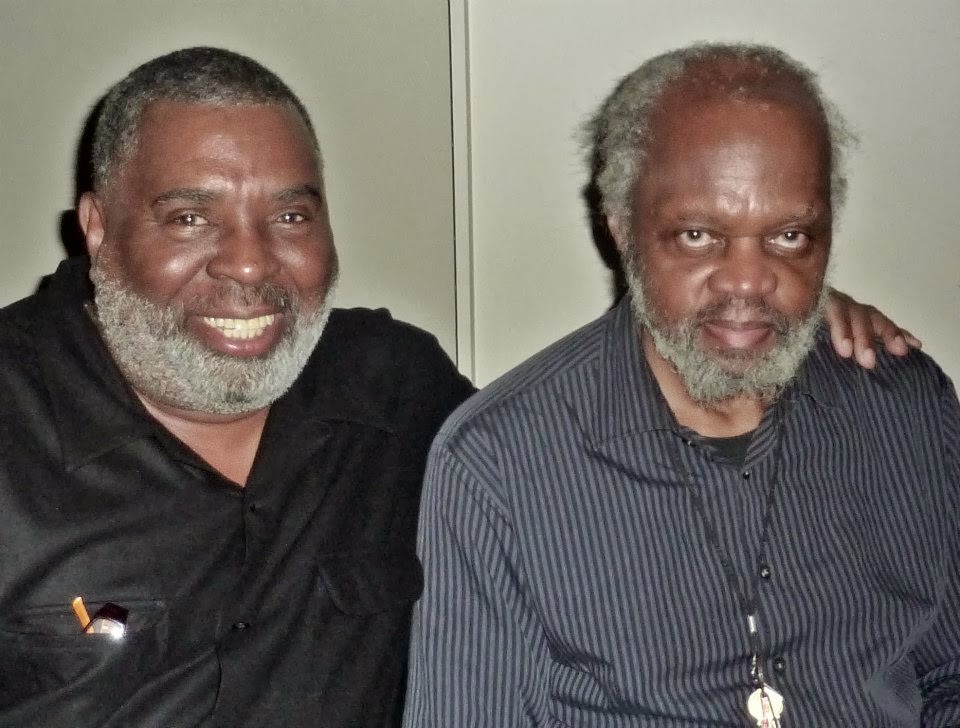Black Arts Movement East, Amiri Baraka, and Black Arts Movement West, Marvin X
Playwright Ed Bullins
Dr. Julia Hare, fiery orator, called the female Malcolm X, her husband founded Black Scholar Magazine.
Amina and Amiri Baraka, baby is Ras, now running for mayor of Newark, New Jersey
Revolutionary art by Elizabeth Cattlett Mora, Negro es bello (black is beautiful)
The Black Arts Movement
Finally, one of the most lasting legacies of the Black Power movement has been the ongoing strength of the Black Arts movement. Not only has Kwanzaa spread, but institutionally and stylistically the black cultural revolution left indelible marks on Rastafarian, hip hop, and spoken word artists. Black Arts festivals began in the 1960s and continue in the annual National Black Arts Festivals in Atlanta.
The Black Arts movement inspired the establishment of some eight hundred black theaters and cultural centers in the United States. Writers and artists in dozens of cities assembled and fashioned alternative institutions modeled after the Harlem Black Arts Repertory Theatre/School (BARTS): Baraka established the Spirit House in Newark; Ed Bullins, Marvin X, Hilary Broadus, and Eldridge Cleaver, the Black Arts West in San Francisco; Kalamu ya Salaam, the Free Southern Theater in New Orleans; Dudley Randall, the Concept East Theater and the Broadsides publishers in Detroit; Barbara Ann Teer and Richard Wesley, the National Black Theater and New Lafayette in New York; Gwendolyn Brooks and Haki Madhubuti, the Afro-Arts Theater, the Organization of Black American Culture and Third World Press in Chicago.
Further, the Black Arts movement inspired Chicago’s giant mural Wall of Respect, devoted to the new voices of black liberation, which influenced murals in communities across the country. A host of new Black Arts and Black Studies journals provided vital forums for the development of a new generation of writers and artists: Umbra, Liberator, Negro Digest/Black World, Freedomways, Black Scholar, Cricket, Journal of Black Poetry, Black Dialogue, Black America, and Soulbook. Larry Neal and Amiri Baraka edited Black Fire, a thick volume of poetry, essays, and drama, which drew national attention to the transformation that was under way among African-American artists.
The influences of the Black Arts renaissance are both profound and far-reaching, reflected in the drama of Amiri Baraka, Lorraine Hansberry, James Baldwin, Ed Bullins, Charles Fuller, Ntozake Shange, Woodie King, Adrienne Kennedy, and Richard Wesley; the painting of Vincent Smith; the photography of Billy Abernathy; the architecture of Majenzi Earl Coombs; the documentary films of William Greaves and St. Clair Bourne; the novels of Toni Cade Bambara, John A. Williams, Alice Walker, Ishmael Reed, Margaret Walker, William Melvin Kelley, Paule Marshall, Nathan Heard, John O. Killens, Rosa Guy, and Toni Morrison; the feature film work of Spike Lee, Samuel Jackson, and Denzel Washington; the acting of Barbara Ann Teer, Yusef Iman, Danny Glover, Lou Gossett, and Al Freeman; the music of Nina Simone, Milford Graves, Marion Brown, Sonny Murray, Abbey Lincoln, and Archie Shepp; and the poetry of Amiri Baraka, Sonia Sanchez, Mari Evans, Haki Madhubuti, Jayne Cortez, Askia Muhammad Touré, Etheridge Knight, Keorapetse Kgositsile, Nikki Giovanni, Gil Scott-Heron, Marvin X and The Last Poets.
Bibliography
Baraka, Amiri. Four Black Revolutionary Plays. New York, N.Y: Marion Boyars,1998.
Baraka, Amiri and Larry Neal, eds. Black Fire: An Anthology of Afro-American Writing.New York, N.Y: Morrow, 1968.
Bracey, John, August Meier and Elliott Rudwick, eds. Black Nationalism in America.Indianapolis: Bobbs-Merrill, 1970.
Carmichael, Stokely. Ready For Revolution : The Life And Struggles Of Stokely Carmichael (Kwame Ture) / Stokely Carmichael. New York: Scribner, 2003.
Carmichael, Stokely and Charles Hamilton. Black Power: The Politics of Liberation in America. New York, N.Y: Random House, 1967.
Carson, Clayborne. In Struggle: SNCC and the Black Awakening of the 1960s.Cambridge, Mass.: Harvard University Press, 1996.
Hogan, Wesley C. Many Minds, One Heart: SNCC’s Dream for a New America. Chapel Hill: University of North Carolina Press, 2007.
Jefferies, Hasan Kwame. Bloody Lowndes: Civil Rights and Black Power in Alabama’s Black Belt. New York: New York University Press, 2009.
Jeffries, Judson. Black Power in the Belly of the Beast. Urbana, Ill: University of Illinois Press, 2006.
Smethurst, James. The Black Arts Movement: Literary Nationalism in the 1960s and 1970s. Chapel Hill: University of North Carolina Press, 2005.
Theoharis, Jeanne F. and Komozi Woodard. Groundwork : Local Black Freedom Movements In America . New York: New York University Press, 2005.
____________________________________. Freedom North: Black Freedom Struggles Outside the South, 1940-1980. New York : Palgrave Macmillan, 2003.
Woodard, Komozi. A Nation Within a Nation: Amiri Baraka (LeRoi Jones) and Black Power Politics. Chapel Hill : University of North Carolina Press, 1999.























